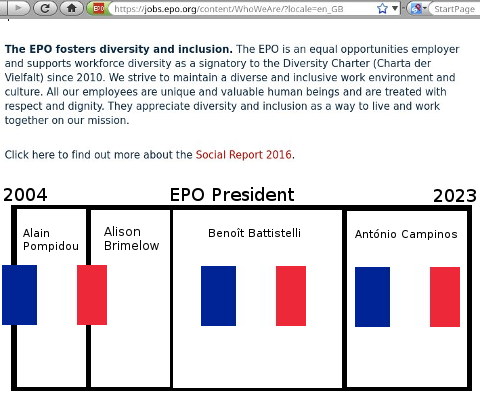

MANY EPO scandals that include nepotism have been covered here for over four years. 3 out of 4 successive EPO presidents are French and that has a lot to do with politics as well as lobbying, including by Battistelli, who intervened to have António Campinos appointed. Pompidou was reasonably OK (not perfect, there were a few complaints associated with him as well) and a few hours ago I received the following comment in French:
Avec le comportement radicalement antisocial et délibérément dictatorial du précédent président français de l'OEB, la France va pour longtemps paraitre indésirable au niveau exécutif de l'OEB aux yeux de nombreux pays membres. On peut déjà être heureux que le Français soit encore considéré comme langue officielle de l'OEB. Dans un passé relativement récent, Mr Pompidou a été un président français raisonnable et diplomate qui a été respecté, bien que tout le monde savait y compris lui-même que son implication dans les brevets ne lui permettait pas de s'imposer en tant qu'expert de la propriété industrielle au niveau international. Evidemment, la renommée de son père adoptif a été déterminante dans sa nomination à la tête de l'OEB.
Mr Batistelli, par contre, a profondément blessé toute une profession, les examinateurs aussi bien que les mandataires, spécialement par son mépris du droit de la propriété inustrielle. Son trop long mandat à l'OEB a sapé tous les efforts diplomatiques de la France dans les années 1970 à 2010. L'INPI qu'il a dirigé n'a jamais eu une politique d'examen quant au fond très développée et il ne pouvait se prévaloir de cette expérience puisque l'INPI a délivré pendant très longtemps des brevets sans examen sérieux.
L'Allemagne, les Pays-Bas, la Grande-Bretagne, la Suisse ont été des membres fondateurs de l'Organisation européenne des brevets qui, à la différence de la France, avaient de longue date développé un examen quant au fond de qualité, ce qui reste dans les mémoires toujours maintenant et qui reste le seul élément important pour l'industrie mondiale. La désindustrialisation de la France dans les dernières décennies n'est pas pour donner à la France un rôle de 1er plan dans le développement de la protection par brevets.
Il est vrai que l'évolution actuelle du droit communautaire attire les convoitises de chaque pays pour occuper les places importantes de la structure de l'OEB. Souhaitons que les choix des responsables soient basés, non pas sur des motifs politiques aveugles, mais sur des raisons sérieuses et consistantes.
Ces réflexions sont basées sur mon expérience d'examinateur pendant 10 ans à l'INPI puis pendant 30 ans à l'OEB. Ceci autorise une vue d'ensemble certainement crédible.
With the radically antisocial and deliberately dictatorial behavior of the former French President of the EPO, France will for a long time appear undesirable at the executive level of the EPO in the eyes of many member countries. We can already be happy that French is still considered the official language of the EPO. In a relatively recent past, Mr Pompidou was a reasonable and diplomatic French president who was respected, although everyone knew, including himself, that his involvement in the patents did not allow him to prevail as a expert in industrial property at the international level. Evidently, the fame of his adoptive father was decisive in his appointment as head of the EPO.
Mr. Batistelli, on the other hand, has deeply hurt a whole profession, examiners as well as agents, especially by his contempt for industrial property rights. His lengthy tenure at the EPO undermined France's diplomatic efforts in the 1970s to 2010. The INPI he led never had a substantive substantive examination policy and he did not could benefit from this experience since the INPI issued for a very long time patents without serious examination.
Germany, the Netherlands, Great Britain, Switzerland were founding members of the European Patent Organization which, unlike France, had long developed a substantive quality examination, what remains in the memories always now and which remains the only important element for the world industry. The deindustrialization of France in recent decades is not to give France a leading role in the development of patent protection.
It is true that the current evolution of Community law attracts the desires of each country to occupy the important positions of the structure of the EPO. Let us hope that the choices of those responsible are based, not on blind political motives, but on serious and consistent reasons.
These reflections are based on my experience as an examiner for 10 years at the INPI and for 30 years at the EPO. This allows for a certainly credible overview.